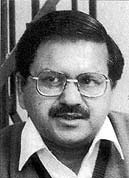
Transformation: Sultan Shahin
believes that there is a logical progression in the history of religion. He
gives an example: "While Islam is absolutely monist, people wonder why the Quran
rarely gives arguments in support of that standpoint. The reason is that God had
already taught that through Vedanta and yoga. So, the Quran is specific that you
cannot be a good Muslim unless you respect the earlier prophets of whom there
were 1,24,000." Shahin extends the argument to assert that the New Age has
synthesized the knowledge from various spiritual traditions as well as science.
The bottom-line: there is only universal consciousness; the universe is a
manifestation of that: and we are all spirit beings. -- Praveen
Chopra in Life Positive monthly magazine,
June 1997
Transformation
Sultan
Shahin, a journalist, spoke to Praveen
Chopra
Is this man for real, you
wonder. He has the temerity to write that Muslims in India should have no qualms
in claiming their Vedic heritage. Or that Muslims' prayers remain unheeded
because they have forgotten how to pray effectively, to meditate that is. He
calls the Babri mosque demolition an opportunity for Muslims to learn some
lessons and to feel grateful to God for making it possible.
They can, for example,
exert their right to forgive and thus set both parties to the dispute free of
the karmic debt. This is provocative stuff. But Sultan Shahin, son of a maulvi
(Muslim priest) and married to a Hindu, is an unusual man. His journey of
transformation has been atypical too. He was attending a barbecue party in
England about eight years ago where one face-reader told Sultan that his
birthday must be on October 26. For Sultan, this was too close to reality
(October 27) for comfort.
Starting with astrology,
Sultan went on to delve into spirituality. One of the things he tried was the
Hasidic Jewish prayer about forgiving all people who might have hurt one
physically, psychologically or financially in the past. For him, this brought
back memories: the experience of hurt and living through the accompanying pain
again. It wasn't just a load off his shoulders metaphorically; the pain he used
to suffer in his shoulders and back disappeared, too. This demonstrated for him
the relationship between experience and the body, which is a store-house of
experiences. Growing in knowledge, he becomes aware that all that is is energy.
Sultan believes that the less conscious we are of the density of things, the
freer we are of illusion.
In retrospect, Sultan says,
he had faintly realised such truths even as a teenager. Born in a village in
Bihar, he used to take the cattle out for grazing which gave him ample time to
reflect. The thinker in him made him argue with his father: "Why do you want me
to pray to a God I don't understand?" He stopped doing namaaz (prayers) but
promised his father that he would study all religions, particularly Islam, and
choose the one that most convinced him.
Meanwhile, his father died
and being the eldest son, he had to shoulder the responsibility of supporting a
large family. He learnt lessons from both hard work and adversity. He improvised
in his own way—akin to creative visualization—which helped him to relax within
seconds by imagining that he was flying on clouds. Adversity, Sultan believes,
is a great boon. "Only when he is in a loving mood, God gives you a problem. The
bigger the problem, the more confidence he has in you."
Sultan believes that there
is a logical progression in the history of religion. He gives an example: "While
Islam is absolutely monist, people wonder why the Quran rarely gives arguments
in support of that standpoint. The reason is that God had already taught that
through Vedanta and yoga. So, the Quran is specific that you cannot be a good
Muslim unless you respect the earlier prophets of whom there were 1,24,000."
Sultan extends the argument to assert that the New Age has synthesized the
knowledge from various spiritual traditions as well as science. The bottom-line:
there is only universal consciousness, the universe is a manifestation of that:
and we are all spirit beings.
Courtesy: Life Positive, June 1997




 Sultan Shahin
Sultan Shahin


0 comments:
Post a Comment